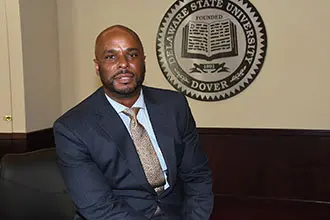
strategic plan and the need for a process evaluation. The purpose of the strategic plan follow-up was to create incentives for continuous improvement, data on the impact of activities, and information for decision-making. To this end, key revisions were made to our mission, vision, and plan that reflect our capacity (intellectual and physical), culture, and aspirations. To anchor the new mission, vision, and strategic goals, Dean Casson inaugurated the following “Pillars of Thought”:
- IDENTIFY AND STRENGTHEN THE COLLEGE OF BUSINESS’ STRATEGIC COMPETITIVENESS. Focus on identifying and building strategic/selective areas of expertise to sustain our relevance and competitiveness and to help strengthen and diversify regional economic sectors, thus contributing to the communities’ and regions’ economic development and global competitiveness.
- SERVE REGIONAL HUMAN CAPITAL AND WORKFORCE NEEDS. Consider human capital development to mean the cultivation of intellect, general knowledge, career/occupation skills, life / civic responsibility, and global citizenship—and encompassing diverse populations (age, race, and ethnicity) served directly or indirectly.
- CONTRIBUTE TO THE HEALTH AND WELL-BEING OF THE COMMUNITY AND PEOPLE THE COB SERVES. Share responsibility with many other organizations in DSU’s communities and regions for achieving health, wellness, and social well-being of people and communities.
- ENGAGE IN REGIONAL INNOVATION ECOSYSTEMS. Help create and be active in an interconnected, regional ecosystem (formal framework of knowledge, services, capital, and resources) that supports innovation-based economic development and comprises elements provided by the government, business, industry, not-for-profit, and institutional collaborators.
- WE ARE STUDENTS OF PROBLEMS, NOT DISCIPLINES. Create an academic environment that fosters interdisciplinary approaches to solving the challenges faced by today’s society.
Dean Casson captured this transformational change in mission, vision, and thought by establishing the Office of Student Engagement (OSE). The OSE was created to provide targeted co- and extra-curricular programming to business school students during the 80% of the time they are outside the classroom. OSE has been a trailblazer in this area and has garnered unprecedented private and public sector support for such innovative initiatives as the Executive POD (Pipeline of Diversity) Mentoring program and DEEP (Delaware Executive Exchange Program) Day. This strategic initiative was developing concurrently with Dean Casson’s Place-Making strategy. Dean Casson’s Place-Making strategy entailed creating a “Learn, Work, Play” environment that transformed the COB’s building into a shared workspace and community lounge environment inviting students, faculty, and staff to engage in healthy and stimulating discussions outside of the classroom.
To uniquely complement the Place-Making strategy, Dean Casson, in partnership with corporate partner Rap Snacks, impelled the development of Innovation Café (iCafé). iCafé’s mission is to provide educational, experiential, and collaborative café space that develops and fosters food entrepreneurship, product development/design, health and wellness, and sustainability.
Moreover, the iCafé serves as the innovation “water cooler” for our community of creators and entrepreneurial ecosystem.
Driven by the philosophy that, “It is better to create a job than find a job.” Dean Casson has uniquely spearheaded public-private partnerships, which have created a robust entrepreneurial ecosystem starting with a revised innovative and student mission for the College’s traditional outreach arm, the Delaware Center for Enterprise Development. Additionally, Dean Casson has instituted a one-of-a-kind ideation, innovation, and maker’s space called the Garage. The Garage, driven by the Thought Pillar - “Student of Problems, Not Disciplines,” leverages the United Nation’s 17 Sustainable Development Goals to drive global awareness and solutions to the world’s most challenging problems.
Moreover, and in line with COB’s community engagement thought pillar, Dean Casson, in partnership with NCALL LLC, has extended the entrepreneurial ecosystem into Downtown Dover, DE (a socially and economically distressed community) via the establishment of the Center for Urban Revitalization and Entrepreneurship (CURE). The mission of CURE is to create a shared workspace to cultivate and invest in community development and entrepreneurs and inspire community collaboration for economic growth. Additionally, Dean Casson has ensured the COB and University’s place in the regional innovation ecosystem via our inclusion in the NSF I-Corps Diverse Emerging Entrepreneurial Partnership (DEEP) Tech Hub. This groundbreaking Hub represents a $15M investment by NSF with DSU’s COB charged with leading the Hub’s effort in bringing diverse communities to the ecosystem.
Finally, Dean Casson has spurred the creation and revitalization of Centers of Excellence that uniquely leverages and deploys the human and physical capital of the COB for community and economic development in regional economies. This is evidenced by the impactful work conducted by the Center for Financial Innovation and Technology (CFIT) and the most recent partnership with the Charles Schwab Foundation to launch the College’s Financial Literacy Institute (FLi).